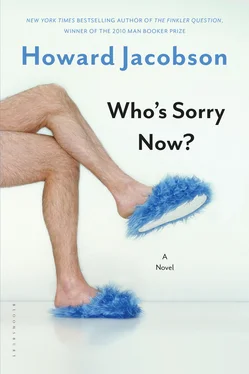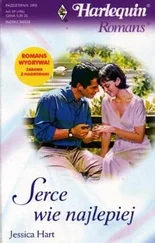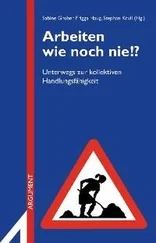And then into the window with his sleeves rolled up, engineering his display on the simple joyous principle of ascent, the stock rising in vertiginous tiers like an Umbrian hill town. Why did he love that effect so much? One set of rooftops rising behind another. The purses and wallets first, then the handbags, then the vanity cases, then the sports bags, then the travellers and shoppers, and at last the suitcases. Infinity; was that it? Was he building a graduated Tower of Babel to the heavens, leaving no space for God to express His indifference? It looked shit, anyway, as his first manageress found the courage to tell him. Nobody had dressed a window like that since 1930. She was wrong, as he showed her, walking her up and down Tooting Broadway. Everybody in travel goods dressed their windows like that. She wrinkled her nose like a money pouch. Wasn’t that her point? Did that make it any less shit? He took her meaning and shortly after took her to bed. Mixing business with pleasure? No — mixing pleasure with pleasure. Do that wrinkle thing with your nose again. Make your loose change clink. But on the question of window-dressing he knew what he knew, the great lesson learned from his father — purses sell themselves. And cases too.
He surrendered in the end. Had to. Other people opened the cartons and other people designed his windows. He didn’t get it. One bag in a window — what kind of come-on was that? But the times were changing around him. He was an inordinate man, dumped into an age of minimalism. Little by little the smell of rutting camels faded from his nostrils. Purses grew plainer. Handbags more coldly sculptured. The briefcase with its once mysterious vertical recesses, its deep suede slits and dark concertinaed divisions, was now a moulded shell which opened horizontally with an empty-headed click. Even the lovely creaking leather satchel of his childhood had given way to the nylon sportsbag with ARSENAL printed on the side — more capacious, he granted, but less redolent of the hot, serious adventure of learning. Over time, fearful of his pertinacious taste for the bazaar, his staff began to dread his appearances; all he had to do was take off his jacket and start to roll his sleeves up and he’d hear them groan. What choice did he have but to leave them to it? He looked away, distanced himself from the fun of shops and just opened more. A reluctant tycoon. And because his head banged and his heart squelched — accept that a man must somehow express the inordinacy of his emotions — a sentimental votary of love, looser than gossip.
Tonight, though, by one of those queer reversals incident to an old intimacy, it was Charles Merriweather whose eye was squeaking loosely in its unprotected socket, pending the arrival of his coronary elicoidali . ‘She’s gorgeous,’ he said, meaning almost anyone.
Almost anyone, thought Kreitman, shaking his head, who happens not to be his wife. He didn’t bother to follow his friend’s gaze. He knew its promiscuity. Anything on two legs. Fewer, if fewer were all there were. No pattern, no coherence, no discernible predilection, nothing that answered, say, to Kreitman’s refined and, when you thought about it, wholly consistent preference for mothers of women he liked. Simply skirt. Not for the first time, Kreitman was almost ashamed to be seen out with Charlie Merriweather. These constant husbands! Christ! These unispousal gallants! Daring to pronounce the phrase nice sex with a mouth full of dim sum one minute and then to be up for every other sort the next. So what kind of sex was this which Charlie couldn’t deny himself, squirming around in his low-backed steel chair, lapping at everything that clattered past — not nice or nicer?
‘Charlie, she’s young enough to be your reader.’
‘Oh, crikey, is she? Nice, though.’
So there — not nicer, not not nice, simply nice, simply as nice .
After more than twenty years of veering from the straight and narrow, Marvin Kreitman wondered if he had only now touched the bottom of betrayal. As nice . Eeny meeny miny mo. Shall it be you or shall it be you? True, the cesspit of sameness of which poor Charlie had vouchsafed him a glimpse was only in his head, but was that what the insides of the heads of all good husbands necessarily looked like? In which case which of them was the better husband — Charlie, who would do unto others (if he could) exactly what he did unto his wife (if she still let him), or himself, Marvin the Cad Kreitman, who knew what he liked but never, on principle, felt the same way (tears apart) or spoke the same words twice?
Kreitman gave in to a twinge of concern for the other Charlie. He was marginally responsible for their marriage, having introduced them, on a hunch, at a student party. Charlie, meet Charlie. He had pulled her out of a chair for himself at first, liking her long lolloping milkmaid’s body, her boxer’s jaw and her unexpectedly tiny hands. ‘Oh, God, I don’t think I can,’ she had laughed, meaning do the dance of the hour, the Bump. ‘Nonsense,’ Kreitman had said, ‘you’re built for it.’ And she was. When Charlie bumped you you stayed bumped. ‘Try to be more rubbery,’ he suggested. ‘Try to bounce off the other person’s hip, and also not to put the other person in hospital.’
‘Oh, God, I’m sorry. I did tell you. You can put me back where you found me, if you like. I don’t mind if you pass on me.’
He didn’t do that, but he did decide to pass her on. She was a happy find, a lovely girl, brimming over, beyond the common, exciting at some level, maybe potentially exciting, exciting in the bud, but she was just too raw for him. The vegetable in her seemed to outweigh the animal. He smelled parsnip on her. She made him think of the frost-hard earth. And of those English counties he found least congenial. Given the choice, he went for women who evoked the inside rather than the outside world, women who whiffed of chemical things, perfume rather than sward, and who had shiny surfaces like him, who reflected light rather than bled it out. But he believed he knew the very panting puppy to go snuffling after her skirts as she traipsed across the golden glebe. And he was proved right. It worked. They adored each other from the off. No sooner were the Charlies an item than she was dressing him, not altering the way he looked exactly, for he was close enough already to perfection in her eyes in his shambling cords and thick all-season lemon socks, but actually doing the buying for him — comprehensively, cap-a-pié , not just the handkerchief for his hacking jacket, or the knitted ties for his Vyella shirts, but the shirts themselves, the big parsnip-tramping shoes, the loose vests, the floppy pyjamas, the vast underpants. Look under the table this very evening and there were Charlie’s sturdy limbs encased in chinos Charlie chose for him from a catalogue. They went from strangers to familiars, knowing everything about and concealing nothing from each other, coining nicknames — she Chas, he Charlemagne — in a matter of hours. He became her child, yes, that was easy to see. And even Kreitman, as a rule squishier hearted about himself than his friends, could not begrudge him that. Poor Charlie had been subjected to the freeze of sensible parenting, ordered about and made downcast by a mother who believed she was failing of her maternal responsibilities if she didn’t remind her children at least twice a day that she believed them to be nincompoops. ‘Doesn’t do for a person to have ideas above his station, or for a child to think he has brains when he hasn’t,’ she told Kreitman when she met him for the first time at Charlie’s wedding. ‘What do you think of this girl, then?’
Though of an advanced age, Charlie Merriweather’s mother was so remotely beautiful, so flintily elegant and straight-backed in the abstemious manner of that last generation of the genuinely colonial English, those who still remembered careering about the globe in boats, attending to one international botheration after another (because who else if not them?), and who to this day bathed in great rusting rectilinear tubs, practising the self-denial they preached — what is more she was so attentive to him , as though he were her beau, a shipboard romance on the way to Cape Town or Aden — that Kreitman would have fallen in love with her on the spot had he not, only an hour earlier, fallen in love with the mother of her new daughter-in-law’s bridesmaid. He took it that her beauty was one of the reasons she had mothered so unsympathetically. There never was a beautiful woman yet who didn’t think her life had turned out less sensationally than her beauty merited, or who didn’t blame her children for every ravage. ‘I’m a widow, you know,’ she told Kreitman. ‘You can write to me, if you like.’
Читать дальше












